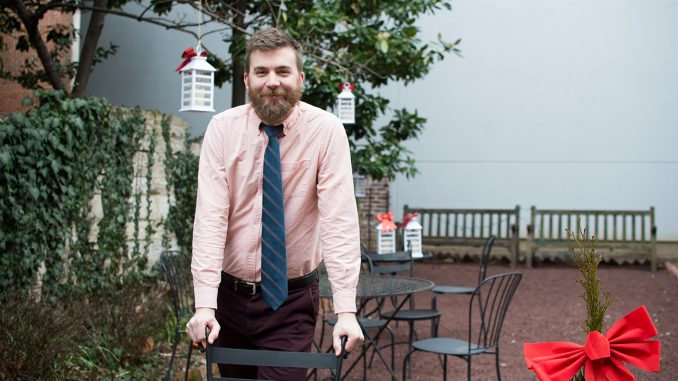
Despite his love of American history, Ted Maust’s fascination with colonial house museums began in Portugal. As a teenager on a family trip, he went to the Pena Palace, a castle that operated as a house museum less than an hour away from Lisbon.
“It’s this weird and wonderful place and it was hard to imagine anyone living there, which was part of the intrigue,” Maust said
In February, the former American Studies instructor and 2018 master’s of public history graduate was named associate director of the Elfreth’s Alley Association. The group works to preserve Elfreth’s Alley, the country’s oldest, continuously inhabited residential street. Located between Arch and Race off of 2nd Street, the alley has existed since 1706.
The site was created when owners and local blacksmiths Authur Wells and John Gilberts made their land public to create a cart-path to the Delaware River in 1706. After a 30-year preservation effort, Elfreth’s Alley received national landmark status in 1960, though residents still live in the Federal and Georgian-style houses lining the cobblestoned street.
Maust said most of his role so far has been “spring cleaning” and planning for the season, which opens on April 5th. He hopes to involve students in the history of the alley by creating internship programs with local colleges, including his Temple, adding student volunteers and regular First Friday programs.
He has also spent time reading the museum’s business files from previous seasons to figure out what changes he can make to increase the amount of visitors and build revenue.
“Trying to understand policies and what’s been tried before — it doesn’t make sense to try something that hasn’t been tried if you don’t know how it failed or why it succeeded,” Maust said.
Maust noted that before his predecessor, the association had no employees, only volunteers and board members. He said part of the challenge is figuring out how to grow the facility with a limited staff and budget.
“With this, there is an opportunity within the challenge to be creative and resourceful. I’m excited because the board is full of creative, resourceful people,” Maust said.
The nonprofit’s main role is preservation, but they also work to maintain the alley’s structure and educate the public about its history. Kelly Murphy, the vice president of the association, said the organization focuses on the alley’s colonial history through its present-day purpose and was excited for Maust to take on the role.
“The fact that Ted was interested organically [in Elfreth’s Alley] coupled with his skill set, and of course Temple is a city institution and we love supporting city alumni, we were pretty happy that it all worked out,” Murphy said.
Seth Bruggeman, a history professor and Maust’s former advisor, said he looks forward to the Maust’s new perspective of more recent history, adding that if Maust can succeed at the Alley, it could become a model for historic sites across the country.
“My biggest excitement is about the fact that Ted, who is very innovative, has an opportunity to shape how a very traditional historic site thinks about its work,” Bruggeman said.
He believes Maust’s increased student engagement offers Philadelphia students a unique opportunity to learn, especially given their close proximity to many historical sites.
“I can’t underestimate the extent to which Philadelphia is the best place in the country to think about the history of history,” Bruggeman said. “The proliferation of historic sites in the city guarantees for us that Philadelphia itself will always be a classroom wherein we can study how decisions about what we remember can be made.”
Maust said he is considering what house museums offer to visitors and the neighborhood, believing the association can offer common ground between history and the present.
“In recent years [Philadelphia] museums have done a better job of talking about common people in a way they didn’t necessarily used to,” Maust said. “It used to be ‘Who’s important?’ ‘Who’s influential?’ I think that the stories on Elfreth’s Alley people who made things, who lived pretty simple lives, there’s potential for people to connect to those stories.”


Well written and compelling interview–so proud of you!!!